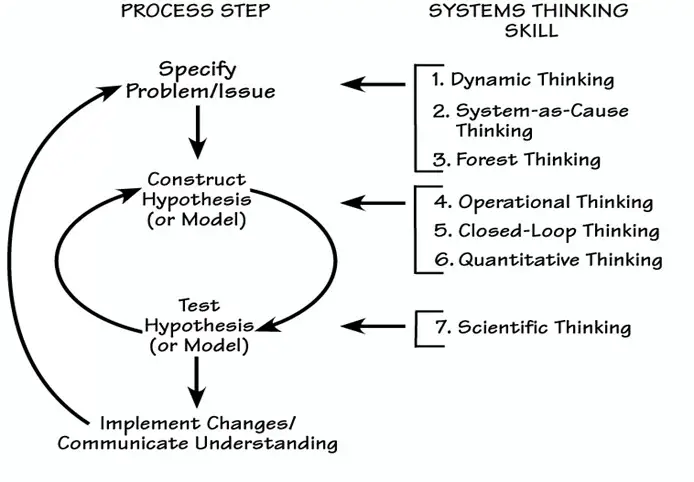Robotic engineers primarily fit into the Thinking (Investigative) and Doing (Realistic) categories. As a result, roboticists must successfully combine two competing work approaches. On the one hand, “investigative” persons typically enjoy problem-solving through thought, reading, and research. Conversely, “Realists” are very pragmatic and enjoy “getting their hands dirty” to find solutions to issues. On the other hand, Robotics requires a careful balance between rigorous research and “fiddling around” or working on actual objects, as I like to say.
1. Systems Thinking
I had heard from a project manager that many robotics graduates become project managers or systems engineers. This is logical. Since robots are highly complex systems, working with them takes expertise across many different fields. We must be skilled in various areas, including psychology, cognition, programming, sensing, electronics, and electrics. A good roboticist can comprehend how these many systems interact with one another and is at ease with the theory underlying them all. This is what distinguishes us as influential systems engineers and project managers. It would be reasonable for a mechanical engineer to respond, “That’s a programming or electrical problem, not my job.” That’s a mechanical problem; that’s different from my job, an electrical engineer might respond. But on the other hand, a roboticist needs to be knowledgeable in each of the several specialties. As a result, having abilities like Systems Analysis and Systems Evaluation is essential for becoming a great roboticist.

2. Programming Mentality
The ability to program is crucial for robots. It makes no difference if you work on low-level control systems, such as constructing controllers in MATLAB, or if you’re a computer scientist creating complex cognitive systems. Any point of the programming abstraction can incorporate robotic engineers. Robotic programming interacts with hardware, electronics, and the (messy) actual environment, which is the significant difference between robotics and other programming disciplines. The globe has more than 1500 different programming languages. A good roboticist will possess “The Programming Mindset,” even though they are not all necessary to know. If and when it is needed, they will feel confident learning any new language.

3. Active Learning
Robotics covers so many different areas that it is hard to study before you need them for a project. I had only touched the surface of robotics themes even after completing a 3-year Ph.D. and a 5-year undergraduate robotics degree. Each time I started a new project, I had to pick up one or two unique abilities. Throughout your entire career, being skilled at active learning is crucial. As a result, a solid foundation in learning strategies and reading comprehension can help you quickly and easily pick up new information when needed.

4. Mathematics
In robotics, there aren’t many “core” abilities (i.e., subjects that can’t be picked up on the fly). Mathematics is one of these natural talents. With a solid foundation in algebra, calculus, and geometry, you would likely thrive in robotics. This is because, at its most basic level, robotics depends on the ability to comprehend and control abstract notions, which are frequently expressed as functions or equations. For example, suppose you want to understand concepts like kinematics and technical drawing, which you’ll probably utilize often in your career, even if it only entails sketching a system on the back of a napkin. In that case, you need to have a solid understanding of geometry.

5. Science And Applied Mathematics
For instance, some people can handle mathematics independently without applying ideas to the outside world. Robotics most definitely only works like this. Robotics requires knowledge of science and other applied mathematics since the actual world is less precise than mathematics. So when a calculation’s outcome is “good enough to work,” a roboticist must be able to judge that fact.

6. Evaluation And Decision-Making
Robotics offers many options, and the ideal response has yet to be found. Roboticists may find themselves in a better position than engineers from more specific disciplines to evaluate difficulties due to their broad knowledge base. Making the most of your work requires the use of judgment and decision-making. You can approach the issue from several perspectives if you have analytical thinking abilities. Critical thinking skills will enable you to utilize logic and reasoning to weigh the advantages and disadvantages of each option.

7. Effective Communication
As a roboticist, you will frequently need to explain ideas to those who are not specialists due to your generalist expertise. To a mechanical engineer, for instance, or a computer scientist, describe a high-level programming difficulty or a structural mechanics issue. Good roboticists provide a communication link between the many fields. Thus, practical communication skills are essential. It’s critical to have the ability to speak and write clearly. Additionally, this is a massive benefit if you are a skilled teacher.

8. Technology Design
When you build a robotic system, you must be skilled at technology design because you can create systems that truly function. Additionally, it implies the capacity to identify the root cause of a problem and suggest potential fixes, which calls for expertise in repairing. Both of these are essential abilities for a roboticist. Robotics uses various technologies; thus, having design-related skills makes it possible to identify the root causes of issues and suggest workable solutions. The ability to “get it functioning” for real roboticists is nearly magical.

9. Solving Complicated Issues
Laos’s well-known saying reads: “You will experience challenges if you prefer things to be simple. You’ll be successful if you like challenges.” With robotics, this is undoubtedly accurate. The preceding skills have shown us that robotics involves using complex problem-solving abilities. You’ll like robotics if you like to solve issues. To solve a problem, one must be able to anticipate it, solve it before it even occurs, and troubleshoot it when it does.

10. Perseverance
The ability to persevere is crucial, given the complexity of robots. It could involve being persistent in looking for a solution to a particularly challenging issue or attempting to convey a difficult concept to others. Good roboticists will also back up their tenacity with dependability to demonstrate that they are as competent and adaptable as robotics demands.


















